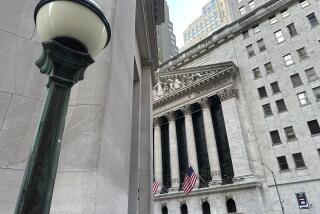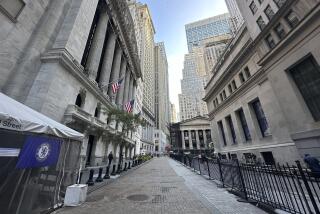Treasury Yields Surge
Treasury bond yields jumped Tuesday as a speech by Federal Reserve Chairman Ben S. Bernanke and a government report on wholesale inflation suggested short-term interest rates would keep climbing this year.
Stocks ended broadly lower, led by some interest-rate-sensitive sectors.
In the bond market, the 10-year Treasury note yield rose to 4.72% from 4.66% on Monday.
The two-year T-note surged to 4.73% from 4.65%.
Bernanke, in a speech Monday evening, sounded generally upbeat on the economy, which some bond investors took as a sign that the central bank would continue to lift its benchmark short-term rate at least two more times.
The rate now is 4.5%, and an increase to 4.75% at the Fed’s meeting next week is considered a virtual certainty by Wall Street.
The big question is how many more rate hikes might follow. Some investors expect the Fed to stop at 5%. Others say policymakers might go as high as 5.5%.
Until the Fed signals that it’s done, other interest rates also could face upward pressure, analysts warn.
“Factor everything together, it’s probably reason to be cautious on bonds right now,” said Don Alexander, director of fixed-income and currency strategy at Citibank Private Bank. “Bernanke didn’t give any indication the economy is slowing.”
The government’s report Tuesday on wholesale price inflation in February also hurt bonds. The core price index, which excludes energy and food costs, rose 0.3%. Economists on average had expected a 0.1% rise.
Inflation worries could compel the Fed to continue tightening credit, some economists say.
“We’re a little bit more bearish than what’s built into the [bond] market,” said Donald Ellenberger, who oversees about $5 billion as co-head of government and mortgage-backed securities at Federated Investors in Pittsburgh. He said there was a “decent probability” the Fed would raise its key rate to 5.25% this year.
The two-year T-note yield hit a five-year high of 4.77% on March 6 and then pulled back as some economic reports hinted that the economy was slowing.
The sell-off in bonds Tuesday triggered a pullback in equity prices.
The Dow Jones industrial average fell 39.06 points, or 0.4%, to 11,235.47.
Broader indexes suffered deeper losses. The Standard & Poor’s 500 index slid 7.85 points, or 0.6%, to 1,297.23.
The technology-heavy Nasdaq composite dropped 19.88 points, or 0.9%, to 2,294.23.
The Russell 2,000 small-stock index, which hit a record high Friday, tumbled 1.3% to 736.10.
“The spike in yields is scaring equity investors here,” said Brian Williamson, a trader at Boston Co. Asset Management.
Falling stocks outnumbered winners by more than 2 to 1 on the New York Stock Exchange.
Among the day’s highlights:
* Sellers targeted some interest-rate-sensitive stocks. Utility shares, for example, were mostly lower. Their dividend yields may look less appealing as bond yields rise. Exelon fell 82 cents to $54.63, TXU dropped $1.29 to $47.14 and Edison International, parent of Southern California Edison, slid 47 cents to $43.05.
* Home builders lost ground on concerns about mortgage rates. Pulte Homes fell $1.40 to $37.71 and Lennar was down $1.21 to $57.64.
* Real estate investment trust shares suffered profit taking for a second day. A Bloomberg index of 155 REIT shares hit a record high Friday and then fell 1.5% on Monday and 1.2% on Tuesday. It is up 12% this year.
Simon Property Group lost $1.60 to $84.55 on Tuesday, Essex Property Trust lost $1.02 to $108.48 and Mills dropped $1.86 to $30.54.
* General Motors helped stem the Dow’s decline, rising on speculation that the automaker may cut costs by offering 70,000 workers incentives to retire. GM jumped $1.15 to $22.
* Some computer chip shares rallied. Rambus gained $1.82 to $36.22 after the company lifted its sales forecast for this quarter.
Nvidia, the world’s No. 3 maker of computer graphics chips, surged $2.39 to $50.79. The stock was raised to “overweight” from “underweight” by brokerage Lehman Bros., which said it expected sales growth to pick up.
* Bally Total Fitness jumped $1.15 to $8.99. Richard Branson’s Virgin Group Ltd. is considering acquiring the largest U.S. health club operator, the New York Post reported, citing unidentified people. Bally spokesman Matt Messinger declined to say whether Virgin or other firms had received copies of the pitch book that its financial advisors have prepared.
More to Read
Inside the business of entertainment
The Wide Shot brings you news, analysis and insights on everything from streaming wars to production — and what it all means for the future.
You may occasionally receive promotional content from the Los Angeles Times.










